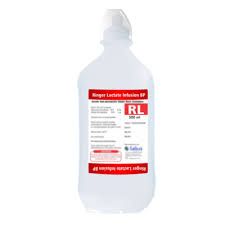Ringer Lactate, also known as Lactated Ringer's solution, is a sterile intravenous fluid used primarily for fluid and electrolyte replenishment. It is classified as an isotonic crystalloid solution and is commonly utilized in various medical settings, including emergency care and surgery.
Key Components
Ringer Lactate contains:
- Sodium Chloride: Helps maintain osmotic balance.
- Potassium Chloride: Essential for normal cellular function.
- Calcium Chloride: Important for various physiological functions, including muscle contraction and nerve transmission.
- Sodium Lactate: Acts as a buffer to help maintain pH balance in the body.
Indications
Ringer Lactate is indicated for:
- Fluid Resuscitation: Particularly useful in cases of dehydration, blood loss, or burns.
- Electrolyte Replacement: Helps restore electrolyte balance in patients with imbalances due to illness or injury.
- Metabolic Acidosis: The lactate component can help counteract acidosis by being metabolized to bicarbonate in the liver.
- Surgical Procedures: Often used to maintain hydration and electrolyte balance during surgeries.
Dosage Instructions
- The dosage of Ringer Lactate is individualized based on the patient’s age, weight, clinical condition, and laboratory determinations.
- Administered intravenously, the rate and volume depend on the specific needs of the patient.
Administration
- Ringer Lactate should be given through a sterile IV setup.
- Continuous monitoring of fluid balance, electrolyte levels, and patient response is essential during administration.
Side Effects
While generally safe, potential side effects may include:
- Fluid Overload: Can lead to edema or pulmonary congestion if administered too rapidly or in excessive amounts.
- Electrolyte Imbalances: Monitoring is required to prevent hyperkalemia or other imbalances.
- Metabolic Alkalosis: Due to the lactate component if given inappropriately.
Precautions
- Use with caution in patients with renal impairment or conditions that predispose them to fluid overload.
- Contraindicated in patients with known hypersensitivity to any of its components.
- Special care should be taken when administering alongside certain medications (e.g., ceftriaxone) due to potential interactions.



